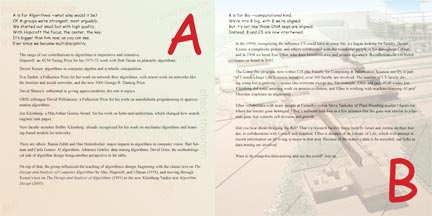 |
|
||||||||||||
| Teaching OO using Java |
| Calculational logic |
| festive occasions |
| ABC book |
| CS Faculty over the years |
| CS@Cornell |
| The Triple-I Administration |
| How Bush Operated |
|
B is
for Bio —computational kind. In the 1990s, recognizing the influence CS could have in comp bio, we began looking for faculty. Dexter Kozen, a complexity person, and others collaborated with the wonderful people in bio throughout Cornell, and in 1998 we hired Ron Elber, who does bioinformatics and protein dynamics. Bioinformaticist Uri Keich came on board in 2003. The Comp Bio program, now within CIS (the Faculty for Computing & Information Science; see Q), is part of Cornell’s huge Life Sciences Initiative; over 100 faculty are involved. The number of CS faculty doing comp bio is growing —seems like everyone except me. For example, Elber and jack-of-all-trades Jon Kleinberg did some amazing work on protein evolution, and Elber is working with machine-learning-AI prof Thorsten Joachims on alignments. Elber collaborates with many people at Cornell —when Steve Tanksley of Plant Breeding couldn’t figure out where his tomato gene belonged, Elber’s software told him in a few minutes that the gene was similar to a human gene that controls cell division and growth. Did you hear about Bridging the Rift? That’s a research facility being built by Israel and Jordan on their border, in collaboration with Cornell and Stanford. Elber is director of its Library of Life, which will attempt to record information on all living systems in that area. Because of the massive data to be recorded, our folks in data mining are involved. Want to do comp-bio/data-mining and see the world? Join us.
|

